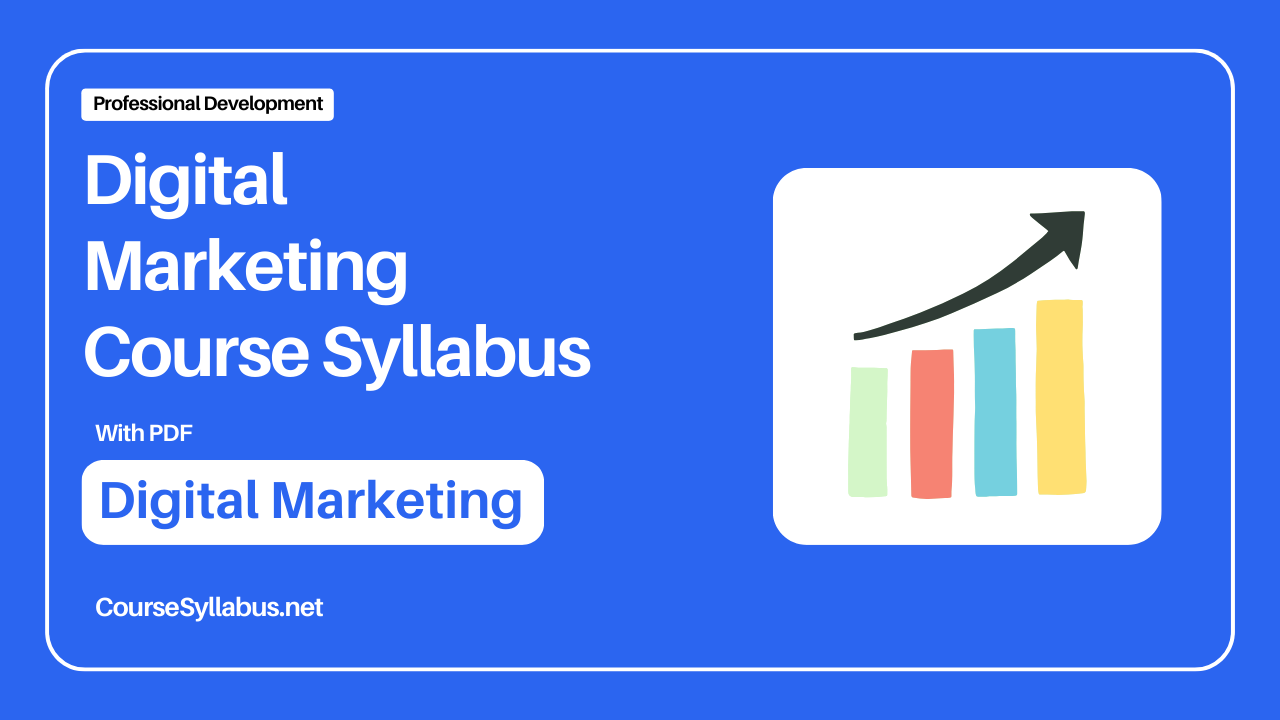Digital marketing utilizes online channels and tools to promote products or services to targeted audiences. It includes strategies such as website optimization, content marketing, social media marketing, search engine marketing, and email marketing. Digital marketing offers cost-effectiveness, targeted reach, measurable results, and global reach, making it essential for businesses to stay competitive in the digital age.
Digital Marketing Course Syllabus
Module 1: Introduction to Digital Marketing
- Overview of digital marketing
- Importance and benefits
- Evolution and trends
Module 2: Website Design and Optimization
- Basics of website development
- User experience (UX) principles
- Search engine optimization (SEO) techniques
Module 3: Social Media Marketing (SMM)
- Platform overview (Facebook, Twitter, Instagram, LinkedIn, etc.)
- Content creation and curation
- Advertising and analytics
Module 4: Search Engine Marketing (SEM)
- Google Ads fundamentals
- Keyword research and targeting
- Campaign optimization and performance measurement
Module 5: Email Marketing
- Building an email list
- Creating effective email campaigns
- Automation and segmentation strategies
Module 6: Content Marketing
- Content strategy development
- Blogging and article writing
- Video marketing and YouTube optimization
Module 7: Analytics and Data Interpretation
- Introduction to Google Analytics
- Metrics and key performance indicators (KPIs)
- Data-driven decision making
Module 8: E-commerce and Conversion Rate Optimization (CRO)
- Understanding the e-commerce landscape
- Conversion rate optimization techniques
- A/B testing and experimentation
Module 9: Mobile Marketing
- Mobile website optimization
- App marketing strategies
- Location-based marketing
Module 10: Digital Marketing Strategy and Planning
- Developing a digital marketing plan
- Budgeting and resource allocation
- Campaign tracking and reporting
Module 11: Legal and Ethical Considerations
- Privacy regulations (GDPR, CCPA)
- Ethical marketing practices
- Intellectual property rights
Module 12: Industry Trends and Future Outlook
- Emerging technologies (AI, AR, VR)
- Predictions and forecasts
- Continuous learning and adaptation
Digital Marketing Learning Resources
There are many resources available for learning Digital Marketing ranging from online tutorials and courses to books and interactive platforms. Here are some popular options:
Time for Learning Digital Marketing
Beginner Level:
- Time: 1-3 months
- Focus: Introduction to digital marketing concepts, basic strategies, and practical skills like website optimization and social media management.
Intermediate Level:
- Time: 3-6 months
- Focus: Deepening understanding of digital marketing channels, and advanced strategies such as search engine marketing (SEM), content marketing, and email automation.
Advanced Level:
- Time: 6+ months
- Focus: Mastery of advanced topics like data analytics, conversion rate optimization (CRO), and developing comprehensive digital marketing strategies aligned with business goals.
Why Digital Marketing?
- Global Reach: Digital marketing enables businesses to reach a vast global audience, breaking geographical barriers.
- Targeted Advertising: Businesses can target specific demographics, interests, or behaviors, leading to higher conversion rates.
- Cost-Effectiveness: Digital marketing campaigns are often more affordable compared to traditional methods, making them accessible to businesses of all sizes.
- Measurable Results: Real-time analytics provide insights into campaign performance, allowing for data-driven decisions and better ROI.
- Engagement and Interactivity: Digital channels foster direct engagement with audiences, enhancing relationships and brand loyalty.
- Flexibility and Adaptability: Quick adjustments can be made based on real-time feedback, ensuring campaigns remain relevant and effective.
- Competitive Advantage: A strong online presence through digital marketing gives businesses an edge in crowded markets, attracting more customers.
Conclusion:
In conclusion, digital marketing is essential for businesses in today’s digital age. It offers a global reach, targeted advertising, cost-effectiveness, measurable results, engagement opportunities, flexibility, and a competitive advantage. Embracing digital marketing strategies enables businesses to stay competitive, reach their target audience effectively, and drive growth and success in the modern business landscape.

